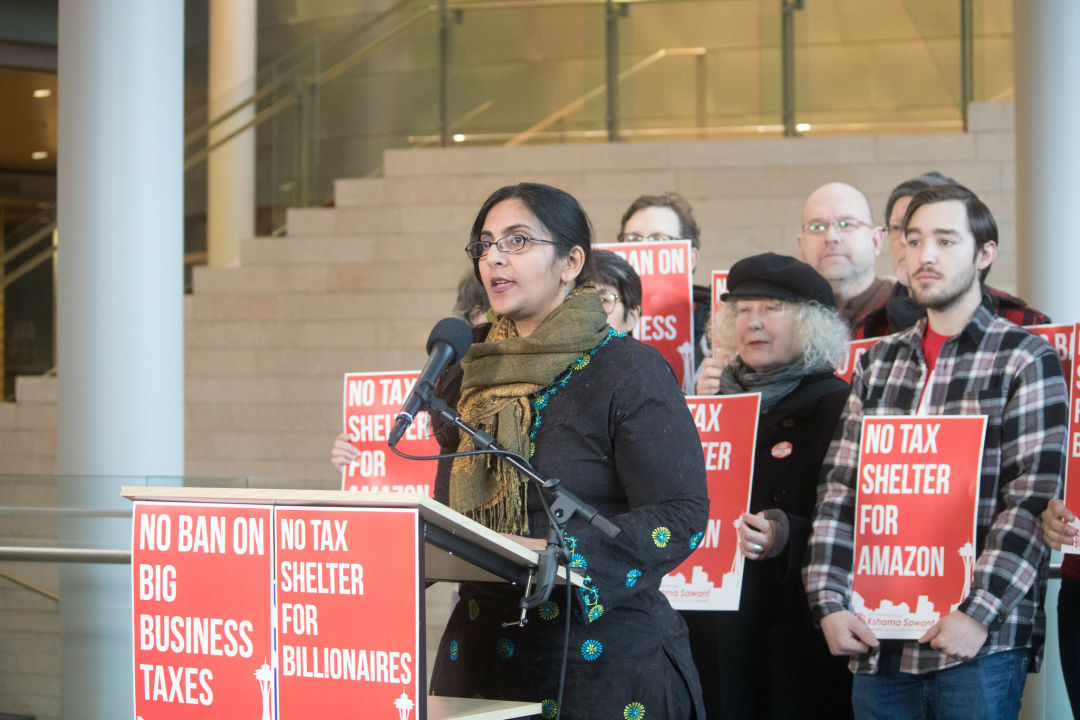What Happens If Kshama Sawant Is Recalled?

Sawant's "Tax Amazon" campaign, a pillar of her support from the left, could also contribute to her political downfall.
Holiday cards and election ballots don't usually mingle in mail boxes. But a campaign to recall Seattle City Council member Kshama Sawant has forced District 3 constituents to balance their civic and social duties this December.
As of Sunday, nearly 36 percent of 77,000-plus voters in a swath of the city encompassing Capitol Hill, the Central District, and Madison Park, among other neighborhoods, had returned their ballots before Tuesday's deadline; in November's election, about 55 percent of those same voters turned out. Still, the rate of early mail-ins for the recall election suggests that this very oddly timed vote could perhaps attract more participation than its predecessor, which included a mayoral race. It's already drawn nearly as much in contributions as the contest for the city's top job.
Sawant's problem: Many of those initial votes (and many of those dollars) came from the affluent corridor running alongside Lake Washington that's less likely to vote "no" on the recall. If November's election served as yet another reminder that progressive voters tend to turn in their ballots just before election deadlines, it also demonstrated that a late push often isn't enough to overcome a big lead.
Marco Lowe, a political science professor at Seattle University and aficionado of local elections, didn't think this recall attempt would even make it to a ballot. "It's a really high bar," he says of getting a court to deem recall charges legally sufficient. Though that doesn't mean the allegations are necessarily true, in Sawant's case, two of the three claims—that she used city funds to support a Tax Amazon ballot initiative and led protesters into City Hall when it was closed because of Covid-19 restrictions—are already proven. (A third, that she led protesters to Seattle mayor Jenny Durkan's house, was denied by Sawant during a recent debate.)
So it's rare for a recall effort to make it this far. Seattle hasn't had one put to voters since 1975, when mayor Wes Uhlman fended off an attempted ousting. What would happen if Sawant, a socialist champion of the $15 minimum wage and rent control, couldn't do the same?
We know part of that answer. City council would appoint a replacement for her in the weeks after the election's certification later this month. While they might still tap a progressive, it's doubtful that person would be as far to the left on the political spectrum as Sawant. Next November, voters would then weigh in on candidates to serve the final year (2023) of Sawant's term.
There's nothing stopping Sawant from running for her seat, or a different political office, again. Kshama Solidarity Campaign spokesperson Bryan Koulouris says that her team is "aware of it," but they're more focused on upping turnout for this election at the moment. The campaign, with an army of organizers toting clipboards and printers, had registered 1,700 new voters as of Friday. "They're doing probably one of the stronger get-out-the-vote efforts we're going to see in this city for an off-year election," says Lowe.
Sawant hasn't really had an easy run, he adds. She's spent big to thwart the Seattle political establishment, calling upon her vast grassroots network instead of big donors. It hasn't failed to this point. "I've never really seen anything slow her down," he says.
But if the recall does work, would it set a precedent for removing politicians in Seattle? Lowe doesn't think so. It's expensive to form such a campaign, and there's no guarantee the court will rule in its favor. The old-fashioned way of rejecting a candidate is more practical. "It's probably easier to wait for the next election."




